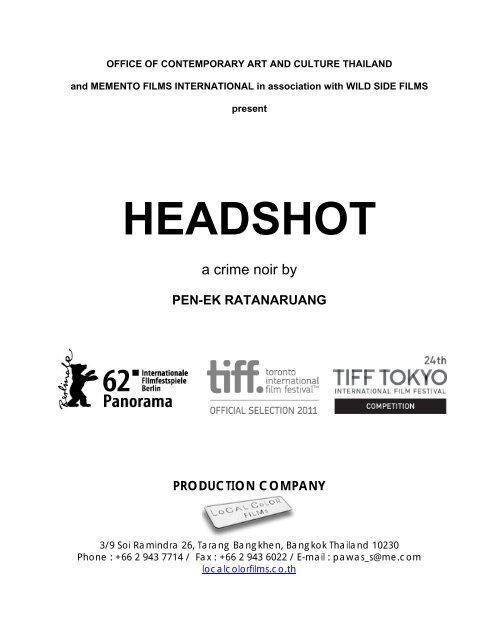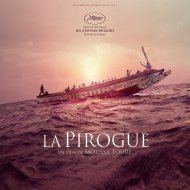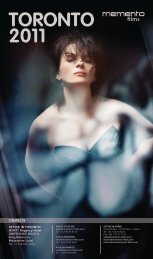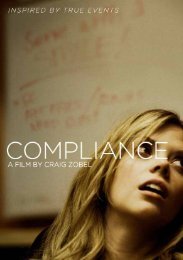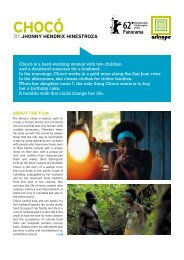Headshot Presskit FINAL - Memento Films International
Headshot Presskit FINAL - Memento Films International
Headshot Presskit FINAL - Memento Films International
You also want an ePaper? Increase the reach of your titles
YUMPU automatically turns print PDFs into web optimized ePapers that Google loves.
OFFICE OF CONTEMPORARY ART AND CULTURE THAILAND<br />
and MEMENTO FILMS INTERNATIONAL in association with WILD SIDE FILMS<br />
present<br />
HEADSHOT<br />
a crime noir by<br />
PEN-EK RATANARUANG<br />
PRODUCTION COMPANY<br />
3/9 Soi Ramindra 26, Tarang Bangkhen, Bangkok Thailand 10230<br />
Phone : +66 2 943 7714 / Fax : +66 2 943 6022 / E-mail : pawas_s@me.com<br />
localcolorfilms.co.th
With funding from the Office of Contemporary Art and Culture Thailand<br />
In association with Wild Side <strong>Films</strong><br />
With the support of the Göteborg <strong>International</strong> Film Festival Fund<br />
In co-operation with Tokyo Project Gathering<br />
INTERNATIONAL SALES AGENT<br />
9 cité Paradis, 75010 Paris, France<br />
Phone : +33 1 53 34 90 20 / Fax : +33 1 42 47 11 24 / E-mail : festival@memento-films.com<br />
international.memento-films.com
Specifications<br />
Original Title:<br />
Based on the Novel by:<br />
Production Company:<br />
Writer/Director:<br />
Producers:<br />
Associate Producers:<br />
Director of Photography:<br />
Editor:<br />
Production Designer:<br />
Costume Design:<br />
Sound Designer:<br />
Music:<br />
Cast<br />
Tul:<br />
Rin:<br />
Joy/Tiwa:<br />
Torpong:<br />
Dr. Suang:<br />
Fon Tok Kuen Fah<br />
Win Lyovarin<br />
Local Color <strong>Films</strong> Co., Ltd.<br />
Pen-ek Ratanaruang<br />
Pawas Sawatchaiyamet, Raymond Phathanavirangoon<br />
Emilie Georges, Tanja Meissner<br />
Chankit Chamnivikaipong<br />
Patamanadda Yukol<br />
Wittaya Chaimongkol<br />
Visa Kongka<br />
Akritchalerm Kalayanamitr<br />
Vichaya Vatanasapt<br />
… Nopachai “Peter” Jayanama<br />
… Celine “Cris” Horwang<br />
… Chanokporn “Dream” Sayoungkul<br />
… Apisit “Joey Boy” Opasaimlikit<br />
… Krerkkiat Punpiputt<br />
Country: Thailand/France Format: Digital 4k Runtime: approx 105 minutes<br />
Ratio: 1:1.85 Colour Sound: Dolby SRD<br />
Language: Thai dialogue with English subtitles
Synopsis<br />
Present-day Thailand is rife with corruption. Tul, a straight-laced cop, is blackmailed by a powerful politician and<br />
framed from a crime he did not commit. Disillusioned and vengeful, he is soon recruited to become a hitman for a<br />
shadowy group aimed at eliminating those who are above the law. But one day, Tul is shot in the head during an<br />
assignment. He wakes up after a three-month coma to find that he sees everything upside down, literally.<br />
Unaware of whether the condition is medical or a result of karmic retribution, Tul begins to have second thoughts<br />
about his profession. But when he tries to quit, roles are reversed and the hunter becomes the hunted. Then he<br />
meets a girl that turns his world even more upside down. Can Tul find redemption from the violence that<br />
continues to haunt him<br />
From the director of 6ixtynin9 and Last Life in the Universe comes a crime noir about a man trying to forget his<br />
past but his past – and karma – won’t forget him. Adapted from the novel “Fon Tok Kuen Fa” (Rain Falling up the<br />
Sky) by award-winning writer Win Lyovarin.
Director's Statement<br />
Although the film HEADSHOT is based on a novel written a long time ago, the political aspect of it is still true of<br />
our country today, if not truer. Politicians, military generals and wealthy businessmen, with their wealth, education<br />
and power, still write the laws and live above them. And common people like us must get used to it. Corruption,<br />
when exercised by this ruling class, is accepted as the norm in this democratic society. So instead of education,<br />
intelligence and humanity, we use tricks, threats, blackmailing and weapons to build our kind of democracy.<br />
Come election time, a hitman can make a better living than a salaryman. And it doesn’t look like change is going<br />
to happen anytime soon.<br />
As for the upside-down vision as experienced by our protagonist, his story can be interpreted as the inevitability<br />
of karmic retribution. How can one find redemption in such a situation I believe that it’s not by being a good<br />
Buddhist, but by accepting the consequences of our actions.<br />
Human beings are all sinners. Innocent or not we are sinners one way or another. Sin is a natural part of our<br />
karma. And our karma is what makes us who we are.<br />
Pen-ek Ratanaruang<br />
June 2011
Of Crime, Corruption and Karma<br />
An Interview with director Pen-ek Ratanaruang<br />
Does this upside-down vision condition really exist in real life<br />
Win Lyovarin, the writer of the novel we adapted the film from, sent me a newspaper clipping several months ago<br />
about a guy who reads and writes upside-down since a rather young age. The man is now in his 60’s, I think.<br />
That’s as close to an upside-down vision as I’ve ever heard of. But someone actually seeing things upside-down<br />
I don’t know...<br />
Talking about Win Lyovarin, what is it about crime noir that attracted you Did it originate from Lyovarin’s<br />
original story<br />
It’s the mystery, cigarette smoke, beautiful women, ugly men, nice clothes, betrayal and perhaps the fact that the<br />
heroes of those films or novels are usually ordinary guys who find themselves in really extraordinary situations<br />
and have to try to survive.<br />
Lyovarin wrote this novel, Fon Tok Kuen Fah, after being inspired by American film noir from the James Cagney,<br />
Humphrey Bogart and Robert Mitchum era. He mentioned this very explicitly in the forward of the novel. So yes, it<br />
originates from the novel.<br />
So to adapt to a noir milieu, did you consciously decide to make this film a departure from your recent output<br />
Stylistically, every film of mine is dictated by the script. It just so happened that my last 3-4 films had been<br />
scripted mostly by me from my own original ideas, so they looked and felt more or less similar. <strong>Headshot</strong>, on the<br />
other hand, was scripted from a novel written by someone else with a very clear intention to be a crime noir. So<br />
we made a conscious decision to conform to that style.
In <strong>Headshot</strong>, corruption seems to infect the very core of Thai society and politics. How much does it reflect your<br />
own belief about the present situation in Thailand<br />
Corruption seems to be at the very core of Thai society and politics for as far back as I remember. And I don’t<br />
think it will disappear anytime soon. This, in my opinion, comes from the fact that our country has given in to<br />
democracy without being really ready for it. Most of the people in our country are still poor, under-educated and<br />
unable to think about things beyond the simple rule of putting food in their mouths and surviving. But at one point<br />
in our country’s history, a group of men, educated in Western countries, overthrew the government and<br />
embraced a system called democracy, thinking that it would make Thailand as civilized as those countries they<br />
were educated from – a form of inferiority complex, I think. And it’s been downhill ever since.<br />
No matter what Tul does, violence always seems to catch up with him. How much do you think this has to do<br />
with fate as opposed to karma<br />
[rhetorically] What’s the difference between fate and karma<br />
But do you think of the upside-down vision as Tul’s karmic retribution<br />
It may be, it may not be. But for sure, it’s something that enlightens him. Having this upside-down vision means<br />
that Tul is forced to look at the world, and life, from a different perspective, both physically and psychologically.<br />
And this is what makes him quit his profession. But as Buddhists, we believe that you get what you give. If we<br />
give kindness unto others, we get kindness back from others. In Tul’s case, he sins. And his most obvious sin is<br />
killing, so there is only one way he can find redemption.<br />
This is your second film in a row with Nopachai Jayanama (not counting your short with him in Sawasdee<br />
Bangkok). Has he in some ways become a muse for you<br />
In my past 14 years of filmmaking, I have yet to find a Thai actor with Nopachai’s intelligence, instinct and<br />
commitment. And since our last outing, Nymph, we’ve become good friends. This helps him to understand more<br />
about where I’m going with this film and it helps me to know what he needs from me to do his job well.
Director's Biography<br />
Pen-ek was born in Bangkok in 1962. He spent eight formative years in his late teens and early twenties in New<br />
York City, where he studied at the Pratt Institute, majoring in Art History. He went on to work as a freelance<br />
illustrator and graphic designer. Back in Thailand, he was appointed Head of Art at the Leo Burnett agency and<br />
spent five years as an art director before directing TV commercials.<br />
He made his debut as a feature film director in 1997 with a movie that broke the mold of Thai cinema, and has<br />
since produced a stream of innovative films. He is one of the handful of directors who have helped to reinvent the<br />
Thai film industry since its slump in the 1990s, and has pioneered both the trend of looking back at retro Thai pop<br />
culture for inspiration and the expansion of Thai cinema into the realms of international casting and coproduction.<br />
His films have been screened in festivals around the world, and he has picked up numerous festival prizes.<br />
Filmography<br />
2011 <strong>Headshot</strong> (Fon Tok Kuen Fah)<br />
2009 Sawasdee Bangkok / segment “Silence” – Toronto Film Festival<br />
2009 Nymph (Nangmai) – Cannes Un Certain Regard<br />
2007 Luminous Sound (Siang Sawang) - short<br />
2007 Ploy – Cannes Directors’ Fortnight<br />
2006 Total Bangkok - short<br />
2006 Twelve Twenty - short<br />
2006 Invisible Waves (Khampipaksa Chak Mahasamut) – Berlin Competition<br />
2003 Last Life in The Universe (Ruang Rak Noi Nid Mahasarn) – Venice Upstream<br />
2002 Mon-rak Transistor – Cannes Directors’ Fortnight<br />
1999 6ixtynin9 (Ruang Talok Hok Kao) – Berlin Forum<br />
1997 Fun Bar Karaoke – Berlin Forum
Cast<br />
Nopachai Jayanama (Tul)<br />
Nopachai “Peter” Jayanama was born on November 21, 1973. He earned much praise for the role of a dashing<br />
general in the historical epic King Naresuan in 2007 and that of a ruthless villain in Angulimala in 2003. Peter<br />
runs his own graphic design company and appears in TV commercials, TV series and music videos. Since<br />
2009’s Nymph, he has also worked with director Pen-ek Ratanaruang on Sawasdee Bangkok (segment<br />
“Silence”) as well as the filmmaker’s latest, <strong>Headshot</strong>. He stars next in King Naresuan Part IV.<br />
Filmography<br />
2011 Chatrichalerm Yukol’s King Naresuan Part III<br />
2009 Sawasdee Bangkok (segment “Silence”)<br />
Pen-ek Ratanaruang’s Nymph<br />
2007 Chatrichalerm Yukol’s King Naresuan Part II<br />
2003 Sutape Tunnirut’s Angulimala<br />
Cris Horwang (Erin)<br />
Celine “Cris” Horwang was born on July 5 th 1980. She studied dancing since she was five years old and enrolled<br />
at the Aree Dance School. She then went on to study in the U.S. at both the Walnut Hill Performance Arts School<br />
in Boston and the California Institute of Arts in Los Angeles, majoring in dance. After returning to Thailand, she<br />
began teaching dancing classes at <strong>International</strong> School of Bangkok (ISB) while modeling and DJing at Fat Radio.<br />
Cris became one of Thailand’s most popular stars after starring in the 2009 blockbuster hit Bangkok Traffic<br />
(Love) Story. She is now one of the most sought-after personalities in Thailand.<br />
Filmography<br />
2010 Yuthlert Sippapak’s Saturday Killer<br />
2009 Adisorn Trisirikasem’s Bangkok Traffic (Love) Story<br />
2008 Yuthlert Sippapak’s Friendship… Never… Die…
Chanokporn Sayoungkul (Joy/Tiwa)<br />
Chanokporn "Dream" Sayoungkul was born on February 1, 1985. She graduated with a Bachelor in Fine Arts,<br />
Communication Design at the School of Architecture and Design, King Mongkut's University of Technology<br />
Thonburi. She has modeled in magazines and photoshoots for brands such as M.A.C.’s Fabulous Feline<br />
collection, LulaRock and Nunatanan, among others. <strong>Headshot</strong> is her first feature film role.<br />
Apisit “Joey Boy” Opasaimlikit (Torpong)<br />
Apisit “Joey Boy” Opasaimlikit was born into a Thai-Chinese family. He started listening to hip-hop when he was<br />
14 years old. In 1994, he was signed to Bakery Music, where he released his self-titled EP. “Fun, Fun, Fun”, his<br />
1995 single with Canadian reggae artist Snow, was a major hit in Thailand. In 2000 he moved to GMM Grammy,<br />
where he now runs his own record label, Gancore Club, and produces other artists. Joey Boy was among the<br />
music artists participating in Ramakien: A Rak Opera, a rock-opera adaptation of Thailand's national epic at the<br />
Lincoln Center for Performing Arts, New York in 2006. In the same year he made his feature film debut in The<br />
Possible, which was followed by the blockbuster comedy Lung Pee Tank 2 in 2008. He is currently is directing<br />
his first feature film, the zombie comedy Gancore Kud.
Crew<br />
Chankit Chamnivikaipong (Director of Photography)<br />
One of Thailand’s most experienced cinematographers, Chankit entered the industry as an assistant cameraman<br />
at Salon <strong>Films</strong> Thailand. He later became a producer at JWT, and is currently Managing Director at The Film<br />
Factory. He has previously cinematographed Fun Bar Karaoke, 6ixtynin9, Mon-rak Transistor, Ploy and Nymph<br />
for Pen-ek Ratanaruang. His other credits include Nonzee Nimibutr’s Okay, Baytong and Jira Maligool’s The Tin<br />
Mine.<br />
Patamanadda Yukol (Editor)<br />
M.R. Patamanadda Yukol is the daughter of one of Thailand's most famous filmmakers, M.C. Chatrichalerm<br />
Yukol. She is a much sought-after editor of TV commercials and feature films, and she is Pen-ek Ratanaruang's<br />
trusted editor who has worked on all of his films, from Fun Bar Karaoke to <strong>Headshot</strong>. She also edited her father's<br />
films, including The Legend of Suriyothai and the King Naresuan series.<br />
Wittaya Chaimongkol (Production Designer)<br />
Wittaya Chaimongkol graduated from the Faculty of Decorative Arts at Silpakorn University. He first came into the<br />
production design field by working as art director and production designer assistant for Pawas Sawaschaiyamet<br />
at the Third Dimension company. They both worked on every movie by Pen-ek Ratanarung since the very start of<br />
his career. Other than film production, he also works in the advertisement field on well-known commercials. After<br />
over ten years of art direction experience, Wittaya became a production designer on films such as The Golden<br />
Riders (2004), Luang Pee Teng 2 (2008) and Deep in the Jungle (2009).<br />
Visa Kongka (Costume Designer)<br />
Born in 1977, Visa graduated from the Fine Arts Department of Prasarnmitr University. She has supervised<br />
wardrobe for most of Pen-ek Ratanaruang’s films, including 6ixtynin9, Mon-rak Transistor, Last Life in the<br />
Universe, Invisible Waves, Ploy, Nymph, the short film Twelve Twenty and many of his TV commercials.
Akritchalerm Kalayanamitr (Sound Designer)<br />
Akritchalerm Kalayanamitr has a Bachelor of Fine Arts in Political Science/<strong>International</strong> Affairs from Thammasat<br />
University and originally intended to join the diplomatic corps. But a strong interest in film sidetracked him into<br />
studying filmmaking in the U.S.. After graduating from film school in 2000, he was active in the ‘underground’<br />
filmmaking scene in the San Francisco Bay Area. Upon his return to Thailand, he taught at the school of audio<br />
engineering and worked with director Apichatpong Weerasethakul for the first time on 2004’s Tropical Malady.<br />
His recent credits include Anocha Suwichakornpong’s short Graceland, Pen-ek Ratanaruang’s Ploy,<br />
Apichatpong Weerasethakul’s Syndromes and a Century, Aditya Assarat’s Wonderful Town and Anat(t)a sound<br />
installation with Koichi Shimizu, among others.<br />
Vichaya Vatanasapt (Music)<br />
Vichaya Vatanasapt was born in Bangkok, Thailand in 1974 and received his Bachelor degree in Architecture at<br />
the King Mongkut's Institute of Technology, Ladkrabang in 1996. He was a founder of the indie girl-fronted band<br />
"La ong Fong" (1996-1997), a member of the ska jazz band "T-BONE" (1998-2009), and a founder of the<br />
electronic dub lounge band called "The Photo Sticker Machine" (since 1999). Also in 1999, he founded the<br />
acclaimed Hualampong Riddim, a music label and production house that scored films such as Pen-ek<br />
Ratanaruang’s Last Life in the Universe and Invisible Waves, as well as the hits Rahtree: Flower of the Night,<br />
Bangkok Traffic (Love) Story and 4bia, among many others.
Producers’ Biography<br />
Pawas Sawatchaiyamet (formerly named Saksiri Chantarangsri)<br />
Born in Bangkok, Pawas Sawatchaiyamet started his career as an art director at Siam Studio, one of the earliest<br />
and biggest advertising companies in Thailand. Pawas attended the New York Institute of Technologies where he<br />
pursued his Masters Degree, concentrating on Film and Television production. He returned to Thailand and in<br />
1999, he made his debut as a feature-length film art director with 6ixtynin9, where he collided with director Penek<br />
Ratanaruang, whom he has continued to work with ever since. 2004 saw Pawas working as Production<br />
Designer on Les Fils du vent (Sons of the Wind), a foreign production shot in Thailand. Later in 2006, Pawas<br />
started his own company, Local Color <strong>Films</strong>. 7 Nights, a film by Cannes's Grand Prix Award Winner Naomi<br />
Kawase, was one of the early films he produced. Soon after, Pawas embarked on another project, producing<br />
Sawasdee Bangkok, a collection of nine short stories depicting Bangkok from different perspectives. His<br />
previous producing credit includes Wisit Sasanatieng’s Red Eagle and Pen-ek Ratanaruang’s Nymph.<br />
Filmography<br />
2011 Pen-ek Ratanaruang’s <strong>Headshot</strong> – Producer<br />
2010 Wisit Sasanatieng’s Red Eagle – Producer & Production Designer<br />
2009 Somkiat Vituranich’s October Sonata – Production Designer<br />
Pen-ek Ratanaruang’s Nymph – Producer & Production Designer<br />
Sawasdee Bangkok (omnibus) – Producer<br />
2008 Naomi Kawase’s 7 Nights (Nanayomachi) – Associate Producer<br />
2007 Pen-ek Ratanaruang’s Ploy – Production Designer<br />
2006 Pen-ek Ratanaruang’s Invisible Waves – Production Designer<br />
2005 Banjong Pisanthanakun and Parkpoom Wongpoom’s Alone – Production Designer<br />
2004 Julien Seri’s Sons of the Wind – Production Designer<br />
Surapong Pinijkhar’s The Siam Renaissance – Production Designer<br />
2004 Pen-ek Ratanaruang’s Last Life in the Universe – Production Designer<br />
Bangkok Confidential Film – Art Dept. Supervisor<br />
2000 Pen-ek Ratanaruang’s 6ixtynin9 – Art Director
Raymond Phathanavirangoon<br />
A film producer and an international film festival programmer, Raymond Phathanavirangoon is currently an official<br />
delegate for Cannes Critics’ Week and the Programme Consultant for the Hong Kong <strong>International</strong> Film Festival.<br />
He also acts as a Creative Consultant for the Asian Film Awards as well as a Reading Committee Member for the<br />
Hong Kong-Asia Film Financing Forum (HAF). Previously he served as international programmer for the Toronto<br />
<strong>International</strong> Film Festival and the Toronto Reel Asian Film Festival. Prior to that, he was the Director of Marketing<br />
& Special Projects for international sales agent Fortissimo <strong>Films</strong>. In 2007, he was a member of the Teddy Jury at<br />
the Berlin Film Festival, and in 2010 a member of the Antalya Film Festival’s international jury. His producing<br />
credit includes Kiyoshi Kurosawa's Tokyo Sonata (2008, Associate Producer), Pang Ho-Cheung’s Dream Home<br />
(2010, Co-Producer) and Boo Junfeng's Sandcastle (2010, Associate Producer). He was a moderator for the<br />
Cannes Producers' Network Breakfast Meetings in 2009 and has spoken on panels at festivals worldwide.<br />
Filmography<br />
2011 Pen-ek Ratanaruang’s HEADSHOT (Producer)<br />
2010 Boo Junfeng's SANDCASTLE (Associate Producer) – Cannes Critics’ Week<br />
Pang Ho-Cheung's DREAM HOME (Co-Producer) – Opening Film, Udine Film Festival<br />
2008 Kiyoshi Kurosawa's TOKYO SONATA (Associate Producer) – Cannes Un Certain Regard<br />
Production Company<br />
Local Color <strong>Films</strong> Co., Ltd. is a Bangkok-based production company whose key goal is to support<br />
producers of international films and commercials in utilizing the production facilities in Thailand. Founded in<br />
2006, Local Color <strong>Films</strong> has continued to grow in its expertise, producing award-winning commercials and<br />
feature films such as Naomi Kawase’s 7 Nights (co-production), Pen-ek Ratanaruang’s Nymph, Wisit<br />
Sasanatieng’s Red Eagle and the omnibus Sawasdee Bangkok, among others. With its international standard in<br />
production service, Local Color <strong>Films</strong> has worked with clients from around the world. For more information please<br />
visit www.localcolorfilms.co.th.


